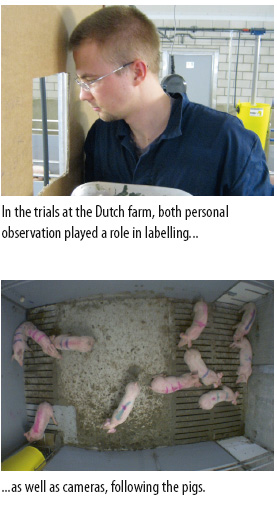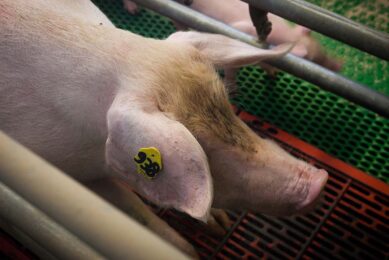PLF project focusing on control of aggression

Monitoring and controlling aggressive behaviour in pigs – that is the ambitious goal of new initial research using the Precision Livestock Farming approach. It was presented in early September at the second BioBusiness workshop in Brussels, Belgium.
Despite being natural behaviour, aggression is generally considered to be unwanted pig behaviour. In grower and finisher houses, aggression can lead to both physiological stress and also physical injuries – and in extreme cases even death.
One way of dealing with this problem would be to find its causes and try to stop it from happening. Since it is quite a common problem, however, another approach could be to learn more about the dynamics of aggressive behaviour and use this as a basis for a targeted approach. Livestock environment manufacturer Fancom, headquartered in the Netherlands, has been one of the driving forces behind this research, of which first results were published in Brussels, in early September.A sophisticated management approach called Precision Livestock Farming (PLF) is at the heart of their approach. PLF aims to use monitoring equipment in livestock operations to identify developments, label these and act upon them. A good example of a PLF approach, not related to aggression, would be the company’s ‘eYeScan’, launched to the European market last year. By the use of a camera on top of feeding facilities in finisher houses, several parameters of an animal can be measured, like weight and size. These data can then be used to determine e.g. what kind of feed should be used.
A second project with a PLF approach revolves around cough detection for identification of respiratory diseases in pigs. Research is in the stages of near completion; Fancom plans to run prototype trials and hopes to launch it to the market in late 2012.As said, the focus of the current research would be to control aggression. Four young scientists, all involved in the BioBusiness project (see box), are currently researching this track. On behalf of Fancom, Polish researcher Maciej Oczak, said: “The eventual goal of the project is to develop a concept approach in which mechanisms can be used that would automatically identify a potential fight – and to design intervention strategies that can act as a result.”The first part of the research fully zoomed in on monitoring and labelling aggression in pigs. To reach that goal, an experimental monitoring system was constructed in a 6,000 grower-finisher farm in the Netherlands, around a pen with only non-castrated growers, on average 23 kg.
They were observed by use of a camera for a timeframe of three days. To get a complete reference of the animal behaviours, two researchers were independently observing the animals, see top photo.
This personal approach facilitated the next step – the analysis and labelling process of behaviours that had started aggression, e.g. nose-to-nose, head-to-head knocking or mounting. On the bottom photograph, at the top left corner, a ‘starting position’ of a fight between grower pigs can be observed. Time, severity, outcome, sounds – all could be determined.
With a surprising outcome: It is possible to identify sequences in aggressive behaviour and patterns in pigs’ body positions during aggression, Oczak said.
The next phase of research will most probably be as difficult: Developing a tool that can act upon the information obtained this way. This strategy, Oczak stated, is still under construction.
BioBusiness research Fancom is involved in the EU-funded project of BioBusiness, a 48-month European initiative zooming in on the possibilities of PLF, and offering twelve ambitious ‘fellows’ to combine technological knowledge with the field of livestock production. Several other companies, like Delaval (dairy cows) and Petersime (layer production) are involved in the BioBusiness project as well, having their own projects in their own industries. In the research on pig aggression, Oczak is cooperating with Lilia Thays Sonoda (University of Veterinary Medicine, Hanover, Germany), Gunel Ismayilova (University of Milan, Italy) and Stefano Viazzi (M3-Biores, Leuven, Belgium). |











